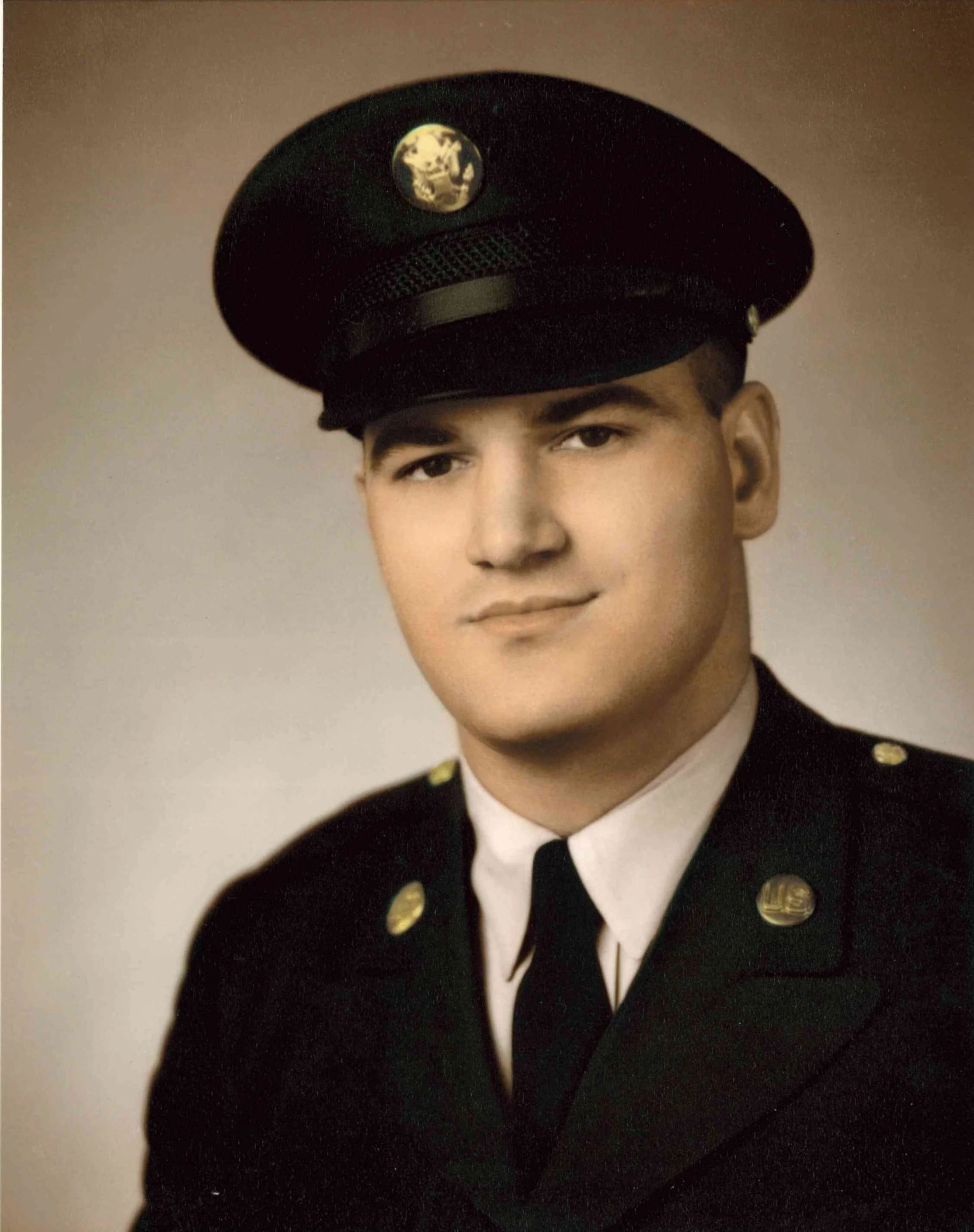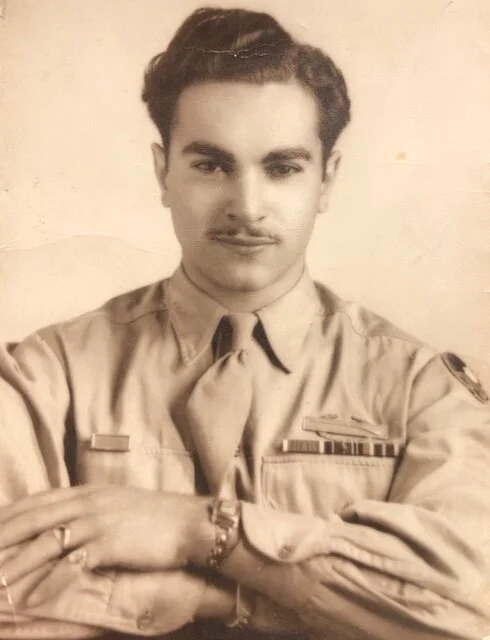A Salute to Chaldean American Veterans
Fred Najor in the Michigan National Guard
By Sarah Kittle
In the rich tapestry of American diversity, the Chaldean community stands out as a vibrant example of immigrants who have not only embraced the American dream but have also contributed significantly to the country’s defense. With a deep sense of patriotism and a commitment to safeguarding the freedoms they’ve come to know, Chaldean Americans in every generation have a proud tradition of serving in the United States military. Hundreds of men and women have joined the effort to protect and serve.
In 2002, the Chaldean American Ladies of Charity (CALC) arranged a tribute booklet and ceremony for Chaldean Americans that have served or are serving in the US military. When many Chaldeans immigrated to the United States seeking refuge and opportunity, they brought with them a strong work ethic and a profound sense of gratitude for their new homeland. Many served in the Army, and a great many were decorated war heroes in World War II, Korea, and Vietnam.
Chaldeans Americans have served their adopted country in conflicts from WWII to the Iraq War of 2014-2017. They helped liberate concentration camps in Germany and Austria and paid witness to the Cuban Missile Crisis from ships offshore. They served as interpreters and cultural advisors in the Middle East. Their stories are unique and incredible and have helped shaped the history of the United States of America.
John Hakim was drafted to serve in World War II. Not an American citizen at the time, he earned his citizenship while overseas. John Cassa was 14 when he joined; he misrepresented his age to serve and was injured during maneuvers, ultimately sharing a hospital room with future Vice President (and self-titled “inventor of the internet”) Al Gore. Michael Denja provided security for former President George H.W. Bush. At least two Chaldean American soldiers served alongside the legendary Elvis, one shipping out with him and one served in training with the historic “King of Rock and Roll.”
Peter Essa served in World War II.
Military from this community tend to be highly decorated as well. Jose P. Denja was recommended for the Congressional Medal of Honor and received the Purple Heart, Silver Star, and Bronze Legion of Merit for his service in Korea. Joseph Essa had served his time in World War II, was wounded several times, and won a Purple Heart. He was eligible for honorable discharge but elected to re-enlist and was killed in action in 1945. Peter Essa, who fought on the beaches of Normandy, was awarded the Bronze Star and the Combat Infantry Badge as well as the European-African-Middle-Eastern Campaign Medal. An article featuring his story was published in the Chaldean News in November of 2020, when Peter was 95 years old.
The Chaldean community in southeastern Michigan was nourished in the 20th century by two fundamental factors: the sacrificial love of family and friends and the generous support of the local Church. Both would factor heavily during wartime. Chaldean people also have a history of enduring adversity and persevering through turbulent times, and they understand the concept of sacrifice. The Yelda Family had 6 brothers who all served in World War II. A woman named Rosemary Yelda, family connection unconfirmed, served in Korea.
This reporter had the distinct honor of sitting down and talking with a few Chaldean American veterans. Tom George, who was drafted into the Army when he was 19, remains grateful for the training. Although he remained stateside and never saw combat, the discipline of boot camp stayed with him his whole life. Many of his friends were sent to Vietnam, and Tom remembers them with affection, especially each year on Veteran’s Day which “keeps the experience of service close to mind.”
One thing most veterans will agree on is that they appreciate their family so much more when they return from service. For Tom, who lost 32 pounds on Army chow, homemade meals were one of the things he missed the most. Army rations are “definitely not like Chaldean food,” he asserts.
“The saddest and most confusing part of serving in the Vietnam era,” says Tom, “was our homeland [America] calling it a ‘worthless war’” when he personally knew so many who had sacrificed their lives. Present-day calls for “defunding the police and villainizing the military,” Tom says, “are hard to witness.”
Tom supports Hire Heroes USA, a nonprofit organization that moves veterans into the corporate world. His transition to civilian life was a little easier than most, as he returned the family business, which, according to Tom, “took care of that without any thought.”
How can civilians show their support for veterans? For Tom, a simple, “Thank you for your service” suffices. It fills him with great pride and honor that he served his time.
George Matti joined the US Navy in 1966. Previously, his brother had joined the Marines. “It was either join for 4 years and pick the branch or get drafted and spend two years in the Army,” George explained to those who asked. (And many did.)
“I’m glad I went when I did,” says George, “but I wouldn’t go back.”
He was stationed on an LST ship, delivering supplies to combat soldiers in Vietnam. One of his worst wartime memories was running aground on a small boat with his captain on a river in Danang. Always a target for enemy fire, it was a harrowing wait before a tugboat rescued them from the sandbar they were stuck on.
Another clear memory of George’s is laying looking up at the stars in a Vietnamese sky and asking himself, “What am I doing?” It was a mind-expanding experience.
“When you go, you’re like a kid,” remembers George. “You grow up real fast.”
What was he doing? “A Chaldean kid from Baghdad,” George says, “A thousand miles from home.” A kid in combat.
Nevertheless, he persevered. He met a Lebanese guy from Toledo who spoke Arabic. George spoke Sureth, but they managed to communicate and became fast friends. Any familiarity goes a long way while overseas.
What don’t people understand about veterans? “They don’t get it unless they have a family member or know someone in the service,” says George. “They think we’re all Rambo.”
George believes that every young person should do one year of compulsory military service. It would greatly benefit most of them, he thinks, especially with developing self-discipline. “The military has a lot of rules,” he says. “Obey them.”
Fred Najor’s was a poor family raising nine kids supported by the family store when Vietnam escalated. The so-called “Living Room War” was the first time that images from a still-active war were brought into the family purview by the magic of television.
Classified as A-1, Fred was next in line to be drafted when he joined the Michigan National Guard. “I’ve got no beef with anyone,” he said, so he opted for a 6-year stint stateside rather than get shipped to a far-off Asian country to kill strangers. At that time, Walter Cronkite’s newscast showed rows of body bags every evening.
“It’s always somebody else’s war,” Fred says. “Old people start wars, and young people have to fight them.”
For a Chaldean American, Fred got a great gig; he was placed in food service. The National Guard trained him how to cook in quantity. He was at Camp Grayling when they received a call that “half of Detroit was burning.” His group hustled back to the 8 Mile Armory and prepared to service the folks fighting to keep peace in the city.
On a run to drop off deliveries at Central High School, Fred’s convoy came under fire. Another truck in the line had a machine gun which retaliated by taking the top off the building that the hostile was shooting from. The hostility lasted for days, and several people were killed. Fred’s family store was firebombed while he was at Camp Grayling, but they were able to stay open, unlike most of the stores in Detroit.
Talking with his fellow veterans, Fred says, “When we look back on it, we were fortunate America opened its doors for us.” He attributes the welcome to the fact that they were Christian. Ironically, that fact is what put them under attack in Iraq. “If we had stayed there,” Fred says, “we would be dead.”
The U.S. military is a fine institution, says Fred, but the powers that be take advantage of their troops and do not put them first. A better system is required, and the point should be peace rather than winning. He’s frustrated by the fact that we as a species are still fighting over land. “We’re so smart,” he says, and should put our power toward peace, not war.
“We helped America stay strong,” says Fred. “I love America. Why wouldn’t I?”


